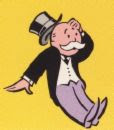I love Robert Reich; he's so great. This is from his blog, where he's talking about what  economists call 'moral hazard' - the likelihood that you'll take more risks if you know somebody will jump in and save your butt later. But as he points out, while bailing out the little guy is often the cause of much harrumphing in Washington, bailing out the big guy is pretty much standard operating procedure.
economists call 'moral hazard' - the likelihood that you'll take more risks if you know somebody will jump in and save your butt later. But as he points out, while bailing out the little guy is often the cause of much harrumphing in Washington, bailing out the big guy is pretty much standard operating procedure.
(The shamelessness of the corporate elite has reached satirical heights when even financial writers themselves are making fun of Wall Street stock brokers and hedge fund managers. When you're done with Reich, read this piece, from Bloomberg News.)
Here's Reich:
When it comes to risky behavior in the market, America has a double standard. We’re told that economic risk-taking is the key to entrepreneurial success, but when big entrepreneurs take big risks that fail it’s amazing how often they get bailed out. Indeed, the history of modern American business is littered with federal bailouts, loan guarantees, and no-questions-asked reorganizations. Some are well known, such as the Chrylser bailout of 1979, the savings and loan bailout of 1989, and the airline bailout of 2001. Most occur in the relative dark, such as the 1998 bailout of giant hedge fund Long-Term Capital Management (courtesy of former Fed chair Alan Greenspan), the not infrequent bailouts of under-funded corporate pension plans by the government’s Pension Benefit Guarantee Corporation, price supports for big agribusinesses facing market downturns, or the current bailout of Wall Street being engineered by Ben Bernanke’s Fed. Behind every one of these bailouts are CEOs or financial executives who were rescued from their bad bets.
CEOs get away with stupid mistakes all the time. Some, like Robert Nardelli, the former CEO of Home Depot, drive their company’s stock so low that their boards eventually oust them. But they leave with eye-popping going-away presents nonetheless. (Nardelli got several hundred million dollars on his departure.) If you’re an average American who gets canned from his job, even through no fault of your own, you probably won’t even get unemployment insurance (only 40 percent of job-losers qualify these days).
Conservatives tell us that unemployment insurance reduces their incentive to find a new job quickly. In other words, moral hazard. Some CEOs use bankruptcy as a means of getting out from under pesky labor contracts they might have "known they could not afford" when they agreed to them (Northwest Airlines most recently, for example). Others use it as a cushion against bad bets. Donald ("you’re fired!") Trump’s casino empire has gone into bankruptcy twice -- most recently, last November, when it listed $1.3 billion of liabilities and $1.5 million of assets -- with no apparent diminution of the Donald’s passion for risky, if not foolish, endeavor. After all, his personal fortune is protected behind a wall of limited liability, and he collects a nice salary from his casinos regardless. But if you’re an ordinary person who has fallen on hard times, just try declaring bankruptcy to wipe the slate clean.
A new law governing personal bankruptcy makes that route harder than ever. Its sponsors argued -- you guessed it -- moral hazard. Bush’s "ownership society" has proven a cruel farce for poor people who tried to become home owners, and his minuscule response to their plight just another example of how conservatives use moral hazard to push their social-Darwinist morality. The little guys get tough love. The big guys get forgiveness.
Saturday, September 8, 2007
Poor Little Rich Boys and the Big Bad Meltdown
Posted by
MW
at
Saturday, September 08, 2007
![]()
Subscribe to:
Post Comments (Atom)

No comments:
Post a Comment